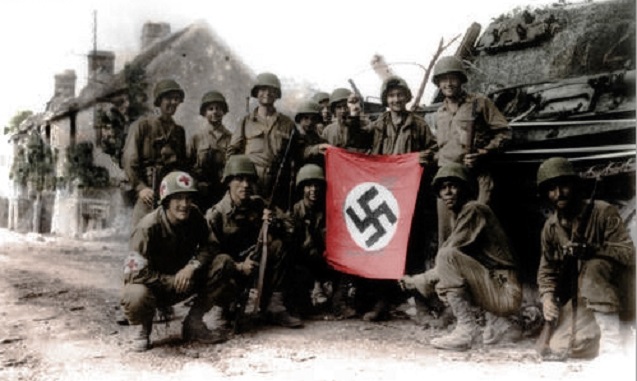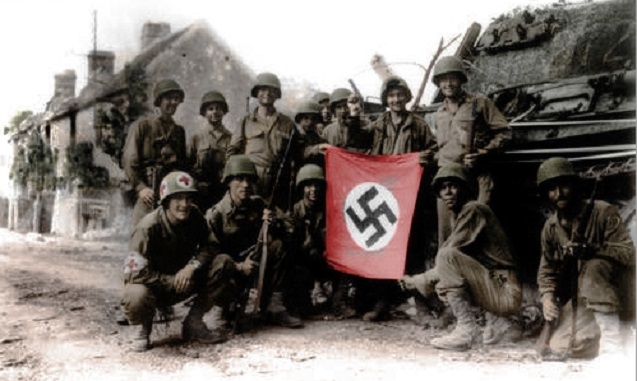
 Za Rodinu / Flickr)” width=”637″ height=”381″ />American soldiers with captured Nazi flag, WWII. (Photo: Za Rodinu / Flickr)
Za Rodinu / Flickr)” width=”637″ height=”381″ />American soldiers with captured Nazi flag, WWII. (Photo: Za Rodinu / Flickr)
A piece of history died on Monday.
Heinrich Boere was 92 years old when he passed away in a prison facility in Froendenberg, Germany, where he was being treated for dementia. At the time of his death, he was the state’s oldest prisoner, and perhaps its most notorious. After all, some 68 years removed from the end of World War II, how many living Nazis from the days of Hitler’s Reich can there be left?
Boere was one such.
Boere was born in Germany to a German mother and a Dutch father, but moved to Maastricht in the Netherlands when he was two. When the Nazis invaded the Netherlands in 1940, he recalled seeing Stuka dive-bombers flying overhead, and remembered his parents being elated instead of afraid. At the time, his mother said, “They’re coming, now things will be better.” Many years later, during testimony he gave at his own trial in Germany, Boere said, “It was better.”
Not long after seeing those Stukas flying above his adopted country, Heinrich Boere became a Nazi himself, wore the uniform, and fought for the Reich on the Russian front. Later, he volunteered for the Waffen SS, the para-military muscle of the Nazi Party that was the brainchild of Heinrich Himmler. By 1943, Boere was part of a hit squad targeting members of the Dutch resistance and anyone else harboring anti-German sentiments. He killed three people by his own admission, and aided in the killing of many more.
After the war ended, he evaded justice for some 60 years, fought the law once he was cornered, and was finally convicted for his crimes. On Monday, he died behind bars, lost in dementia. Only the orderlies, nurses and doctors know what demons were loosed from his mouth once his mind was gone, what confessions he made. He knew what he had done was wrong in the end, or at least he knew others thought he had done wrong; during his trial, he explained why he had never married: “I always had to consider that my past might catch up with me. I didn’t want to inflict that upon a woman.”
Heinrich Boere, known Nazi, known murderer, known collaborator with the filthiest tide to ever wash up on the human shore, is dead. He was not the worst of them, but he was willingly one of them. He did not die free, but in fetters on a prison bed without even his own mind left to him. More than some would say it was a better death than he deserved. Most would say that justice, at least to some degree, was finally served.
But what of us, the children and grand-children and great-grand-children of this awesome and terrible history?
Certainly, the planet is improved by the fact that Heinrich Boere no longer resides on the skin of this Earth, but is buried beneath it. He was not the last living Nazi of Hitler’s Reich, but he is among the last. Very soon now – certainly within the next ten years – the sun will rise upon a world without a single living soul who saw what happened, who participated either directly or by way of tacit approval in the formation and defense of the so-called “Thousand Year Reich.”
In my own way, I mourn the passing of Heinrich Boere. Not because of what he believed or what he did; were I able, I would spit on his grave…and then light a candle, and stand a vigil, because Heinrich Boere is important to us all. When men like Heinrich Boere die, we are one step closer to forgetting that men like him lived at all, one step closer to forgetting that party-sponsored murder gangs like the Waffen SS ever existed, one step closer to forgetting that hate-fueled thuggery thrives in economic chaos, can take over, and can wreak bloody havoc.
When men like Heinrich Boere die, we are one step closer to having men like Heinrich Boere among us again, because we forget what they did when they are gone, and by forgetting, we allow them to live again. Sooner or later, inevitably, they rise when we forget.
General Dwight D. Eisenhower, after visiting Auschwitz at the end of the war, said, “The things I saw beggar description. The visual evidence and the verbal testimony of starvation, cruelty and bestiality were so overpowering as to leave me a bit sick. In one room, where they were piled up twenty or thirty naked men, killed by starvation, George Patton would not even enter. He said he would get sick if he did so. I made the visit deliberately, in order to be in position to give first-hand evidence of these things if ever, in the future, there develops the tendency to charge these allegations merely to ‘propaganda.'”
Eisenhower was a witness. So was Boere. Both men are dead now, and all they saw and knew is lost.
It was George Santayana who said, “Those who cannot remember the past are condemned to repeat it.” Heinrich Boere is dead. Long live Heinrich Boere.
Do not forget him. If we do, we will have to do him all over again. And again. And again.
And again.
We’re resisting Trump’s authoritarian pressure.
As the Trump administration moves a mile-a-minute to implement right-wing policies and sow confusion, reliable news is an absolute must.
Truthout is working diligently to combat the fear and chaos that pervades the political moment. We’re requesting your support at this moment because we need it – your monthly gift allows us to publish uncensored, nonprofit news that speaks with clarity and truth in a moment when confusion and misinformation are rampant. As well, we’re looking with hope at the material action community activists are taking. We’re uplifting mutual aid projects, the life-sustaining work of immigrant and labor organizers, and other shows of solidarity that resist the authoritarian pressure of the Trump administration.
As we work to dispel the atmosphere of political despair, we ask that you contribute to our journalism. Over 80 percent of Truthout’s funding comes from small individual donations from our community of readers, and over a third of our total budget is supported by recurring monthly donors.
You can help by giving today. Whether you can make a small monthly donation or a larger gift, Truthout only works with your support.